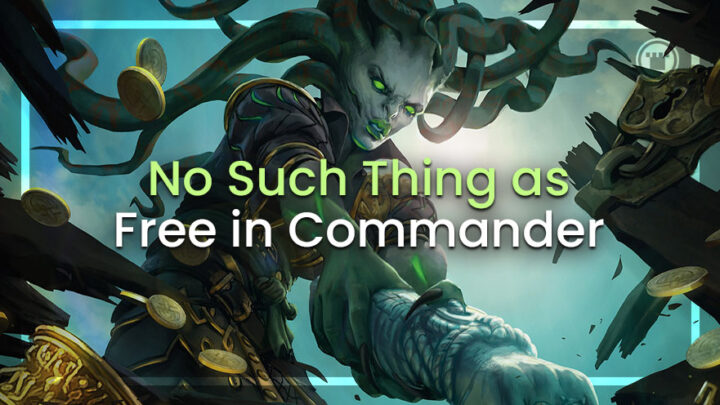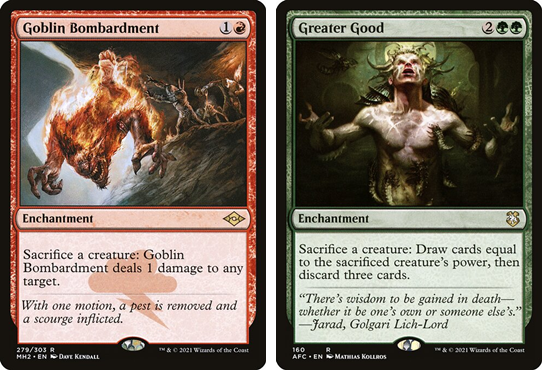There’s no such thing as a free lunch, and likewise, no such thing as “free” in Commander. Kristen is here to help us with some cost-benefit analysis.
Everyone loves free, right? Free bonus cards in your Secret Lair; free door-prizes at the LGS, a free drink with your meal deal. But none of those things are ever truly free.
The free bonus cards in the Secret Lair are used as an enticing marketing tactic. Free door-prizes at the LGS are to encourage footfall and hopefully keep the store open and profitable. The free drink with your meal has already been calculated into the overheads of providing that deal, and the seller is still likely to be making a profit — even if they’re shifting produce that’s going out of date soon.
Commander players love free, too. Whether it’s free spells, free sacrifice outlets or free “value” (whatever that is). They can’t get enough. But what’s the true cost of “free” in Commander?
No Such Thing As a Free Lunch
Free spells are powerful. They allow you to circumvent the mana system, meaning you can increase your spells-per-turn count significantly, and also the effective mana you have available to spend. They allow you to trick an opponent by making it look like your shields are down by tapping out, only to offer an answer to their play. While some of them are less impressive in casual Commander, they’re still worth it when you consider protecting a combo, or stopping a combo, at more competitive tables.
Free spells are also expensive to acquire. Due to how powerful they are, and how few see print, they are a hot commodity. Players want them for Modern and Legacy, too. There’s a very real-world cost to playing with free spells, and that’s that they’ll set you back a pretty penny to acquire. For the most part, at least. Submerge can still be had for under $10, and I really like playing with it.
That’s the first and last time I’ll mention real world cost in this article, however. Good magic cards cost money, and free effects tend to be good magic cards. It’s a cost, sure, but it’s a cost to play the game. You can always proxy, of course, but we’re all magpies for shiny cardboard.
There’s another, more insidious cost to running free spells, and that’s that they also cost you a very real increase in power level. While a stray Deflecting Swat or Flawless Maneuver might not tip your deck over the edge, adding Force of Will, Force of Negation and a bunch of the other more niche effects demonstrates that you’re here to play high powered magic, and that players should make sure they’re not bringing a knife to a gun fight.
Powering up a deck is a cost, and the price you pay is you’re likely to stomp on more casual tables if you’re not careful. While playing counterspells, fogs and removal spells can be fun and interesting, the key is that players are expecting to see equal and opposite forces when balancing a table.
I always advocate for moderation at casual tables, and enjoying the mana game is one aspect of moderation that I think sees success at lower power tables. Having to worry about being blown out constantly, even if opponents are tapped out, is something more advanced tables will find way more enjoyable than the average casual who just wants to chat and drink a few beers while showing off their fun tribal deck.
Making Sacrifices
While some of the free spells don’t filter down to more casual tables, there are other free effects that do — namely, sacrifice outlets. There are countless combos that involve these free outlets (free in the sense that no mana has to be paid to activate the ability). Because no mana is involved in activating them, it lets you play outside of mana restraints, often making infinite mana with ease.
Even outside of combos, these pieces are extremely flexible, offering ways to get creatures in the graveyard to either use their “when this creature dies” ability, to recur them with reanimation effects or just to avoid exile-based board wipes/removal spells.
There’s a very real cost to playing these “free” effects too, though, and that’s being the threat. Whenever a piece like this hits the table, players are likely to call an emergency meeting. They often signify a checkmate scenario and warrant a table-wide game plan about how to deal with them.
The cost to playing free sacrifice outlets is in playing a fragile, highly suspicious permanent. The cost is such that playing an outlet that costs even (1) generic mana goes a long way toward it not being removed mercilessly.
Thinking in this way can help you to develop a better approach to deckbuilding and card evaluation. The cost of playing a card is much more than the mana cost. You must factor in the point in the game you’re likely to play it, the tempo cost of committing to it and what you lose by playing it instead of another card.
Take Vedalken Orrery, for example — a card I refuse to play. Why? Because it costs a lot more than four mana, as it often costs me an entire turn of the game that I could be using to do something else only for it to eat a removal spell anyway. I never find myself in a position where I want to take a turn off to cast it, and would much rather play a more niche effect like Shimmer Myr (cheaper, able to be flashed in and easier to recur) or Vernal Equinox, a card I mentioned last week when I talked about optimizing for fun.
You Can’t Put a Price on Peace of Mind
A lot of sacrifice outlets that cost mana are dismissed in Commander, owing largely to just how much “worse” they are than the ones that are free. While you’ll always take the free ones first, especially if you’re trying to combo, you’re still going to want redundant pieces if you like to play in and out of the graveyard, or if you generate plenty of tokens to fuel your fires.
I’ve been playing a lot with Laurine, the Diversion lately, both in Hofri Ghostforge and in Burakos/Guild Artisan, a Rakdos treasures deck. Two mana might seem like quite the cost to sacrifice a creature, but two mana to Goad? How can you put a price on how useful that is?
The only way to evaluate that is to play with it. I used two activations in a game recently to send a 32/32 Commander and a 40/40 animated land away from my face, and let me tell you — that definitely felt worth the two mana and a creature. While I’ve concentrated mostly on the cost of playing certain effects in this article, it’s also useful to consider the benefits, too.
Friends with Benefits
Sometimes, the best kind of removal is player removal. When someone has an overwhelming lead, you should take them out if you can’t remove their problem permanents. I did just that, recently, when I had to remove a friend who was going off with Ratadrabik (a really cool new Commander, if I’m honest). I pooled all of my resources and suited up my Commander to go for the voltron kill, as they had gained quite a bit of life from multiple Kokusho triggers.
What I didn’t do, however (and which cost me the game) was examine who would benefit from this scenario. While another player in the pod contributed a removal spell to pave the way for me, I had poured way more resources into eliminating the Ratadrabik player than they had.
It would have been reasonable for me to ask for a deal at that point, had I thought to do so. Immunity from a crack back or not eliminating one of my creatures. It would have been fair, as it would have been something for the other player to calculate into their overall costs of getting rid of the problem player at the table.
In essence, you should consider if the cost of you making a play should be passed on to another player. While eliminating a threat costs you a card (or more!), maybe it should also cost another player a small deal, like giving you some space. Don’t just “do the right thing” if it will leave you shields down.
End step
As I’ve demonstrated today, there’s no such thing as a free lunch — not even in Commander. While you get to consume this great content for free, it would help a lot to share it with your friends, or on socials, if you enjoyed it. Head on over to my Twitter page to continue the discussion, and to pass on some benefit to me by staying engaged 😉

Kristen is Card Kingdom’s Head Writer and a member of the Commander Format Panel. Formerly a competitive Pokémon TCG grinder, she has been playing Magic since Shadows Over Innistrad, which in her opinion, was a great set to start with. When she’s not taking names with Equipment and Aggro strategies in Commander, she loves to play any form of Limited.







